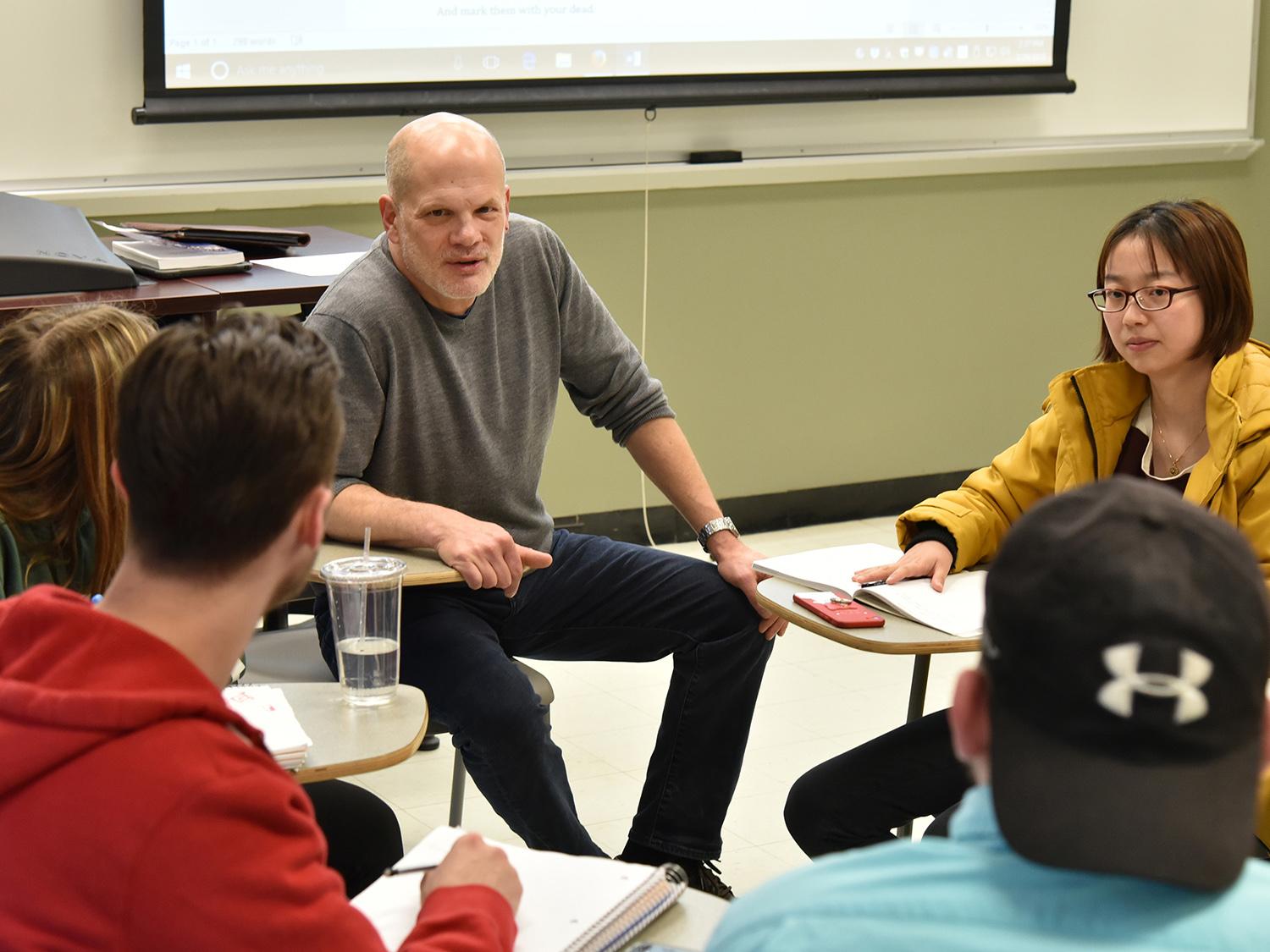Crossing boundaries -- Dr. David Andrews, chair of economics at SUNY Oswego, speaks with students (clockwise from right) Yuqin Jin, Matthew Poteralski, Devlin Murphy and Brooke Kocsis in the course "Economic Development" in Room 111 of Mahar Hall. Andrews and colleagues in two other departments will launch a new major, PPE -- philosophy, politics and philosophy -- this fall.
Abraham Lincoln: politician, philosopher or economist? Was John Stuart Mill just a philosopher? Was Adam Smith just an economist? A new SUNY Oswego degree program to launch this fall underscores the answer: Academic disciplines, like careers, often intersect, regardless of boundaries and labels.
The State University and the New York State Education Department recently gave final approval to Oswego's new major in philosophy, politics and economics (PPE).
Long a staple at renowned Oxford University in Great Britain and at a steadily increasing number of colleges in the United States, PPE will help SUNY Oswego students address issues "that not only can be addressed, but need to be addressed, from at least those three perspectives," said Dr. David Andrews, chair of economics.
Students interested in advanced work at the juncture of these disciplines could pursue careers in law, politics, public service or any field concerned with developing or interpreting social policy: health care, finance, management and many others.
Yet the new program's greatest value, according to Dr. Stephen Rosow, who has led support in political science for the major, is in laying a foundation for concerned and involved citizenship.
"The main thing to understand is that the world does not neatly conform to academic disciplines," Rosow said. "So much of politics involves economic considerations and philosophical issues."
One of the longtime proponents of the new major program, professor and former chair Dr. Craig DeLancey of philosophy, agreed with his colleagues in political science and economics. "Philosophers love interdisciplinary work. We are committed to it," he said. "These are two fantastic departments to work with."
'Perfect fit'
Andrews said he once was an undergraduate economics major, a philosophy minor and was well grounded in political theory. "Had I been an undergraduate today, this would have been a perfect fit for me," he said.
The philosophy, politics and economics program provides students a unique opportunity to study the three disciplines that together constitute much knowledge of how best to form and guide social and political policy.
The PPE major at Oswego offers three tracks: political economics, philosophy and politics, and philosophy and economics. Along the way, any student in the major will take a rich mix of courses engaging issues across all three academic disciplines.
Core courses include micro- and macroeconomics, valid reasoning, ethics, global politics and critical thinking in politics. Among the many electives are "Political Economy of Financial Crises," "Global Environmental Politics," "Philosophy, Public Policy and Public Affairs" and "Social and Political Philosophy."
"We're excited to launch this," Andrews said. "This is a new opportunity. The disciplinary boundaries have been handed down to us, but they are artificial. A number of us in the three departments are interested in the intersections and complementarity of economics, philosophy and politics."
He added, "This gives students a way to signal their range of interests and their versatility."
SUNY Oswego has a long and well-established reputation as an institution that furthers interdisciplinary experiences for its students. For more information, contact the Interdisciplinary Programs and Activities Center at 315-312-3236 or visit oswego.edu/ipac.




